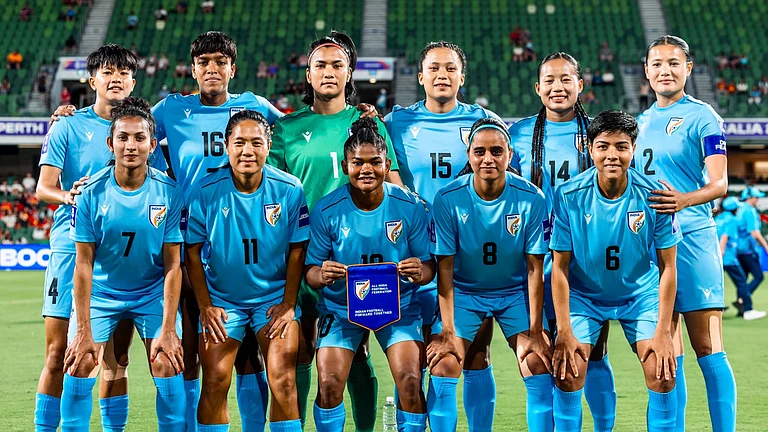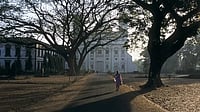Fire Bird by Perumal Murugan, translated from Tamil by Janani Kannan
Published by Penguin Random House

Sometime in March 2016, in Maharashtra the movie Sairat was released. That night after watching the movie, I was restless. I opened a book so that I could calm down. The book was an English translation of Perumal Murugan's Tamil novel Pyre. The consequence of reading that book (which I read in one go) was that I didn't sleep that night. It made me restless over the many questions that are deemed so mundane yet point to a tacit acceptance of the idea of banality of evil. Perumal Murugan, the writer who had entered my life, made me obsessed with the images he created in his stories. I got hold of all his English-translated works and read them in a mission mode; I ate them literally and became more restless. In fact, it was experiencing a state of ecstasy. I discussed him almost regularly with my only friend, philosopher and guide. Our discussions were centred around Murugan's writing and controversies surrounding his works. During one passionate discussion on Murugan's Season of Palms which shed light on the typical features of Indian feudalism; a story foregrounded in the Gender-Caste-Class nexus, my friend imposed a moratorium on me from reading that book further and took away my half-read copy. This was Perumal Murugan, a writer-teacher who introduced me to a very new world of Kongunadu. His writings illuminated a layperson like me, developed in me an understanding of the feudal-slavery conjoint structural operation in the society of India. He was the same author who announced his death as a writer in 2015 as a reaction to the xenophobism organised by state and non-state actors.
Fire Bird, a novel translated in English from the original Tamil work titled Aalandapatchi (an untranslatable Tamil word that means a mystical bird) gives a glimpse of the changing materialistic conditions in the emerging era of market modernity, the changing patterns of society in Kongunadu region in Tamil Nadu, known for its multifaceted distinctiveness. The novel is a portrayal of a crisis that emanates with changing power structures accompanied by the withering of old feudal as well as traditional caste bondages. As we read the novel, in many parts there is a sporadic bursting of fetish compassion which raises a ray of hope for reclaiming humanity. But it doesn't take away the fact that there is a subtle but firm undercurrent of systemic ascending scale of reverence and descending scale of contempt. The societal structure it depicts is an old decaying as well as a decline of traditional Indian society (whose passions are coalesced on the gender-caste-class axis) known for its dogmatic yet malleable, graded inequalities as stated by Dr. Ambedkar.
Marimuthu, the protagonist, is on a unique quest for liberation. His journey of transcendence begins with an event whose consequence is the rupturing of his dignity and its repairs lie in the breaking of ties with his joint patrilineal family. But this search and quest towards the east of Kongu region to find land for farming, to settle down with his new nuclear family is informed by the communitarian and caste consciousness. There is also hope that this transcendence could help him to step into a new realm by embracing uncertainties that would do away with his already fragile stereotypes inherited from his family. It is a sneak peek into the class divide within the Shudra community which Kancha Ilaiah Shepherd divides as upper shudras and lower shudras. The journey gives a foray into the thoughts of Marimuthu who is travelling with his ati-shudra multipronged helper. It slowly takes us to the backward linkages as to why this quest had to be taken in the first place. The events and the images Murugan creates are a reflection of multiple social complexities at work. The son meta-preference is reflected in Marimuthu, his brother's family as well as thoughts of other family members. The gender performing roles which are imposed in this essentialist feudal system, the hegemony of culture and traditions evident in power relations between the brothers is reflected in relative material control over means of production as well as their distribution within the feudal family system. The structure of the family operates on a patriarchal framework with multiple patriarchies acting on females as well as males depending upon the positions in the shastric hierarchy.
Marimuthu, if seen in a Tarkovsky's long shot frame, seems a hetero-male, located in a landowning powerful caste(s), within the comfort of a large family, a historical benefactor of the feudal setup and the consequent surplus accumulation. With the frameshifting slowly towards his close shot - his thoughts, the contradictions of neoliberalism arise. The fragmentation of land, its division only among sons in a non-democratic yet traditional way, has an effect on the conscience and consciousness of brothers. One can gauge that in Marxian terms, this is a perfect reflection of the economic base building up the superstructure of the feudal economy laden with Gramscian cultural hegemony. In fact, it astonished me how the traditions, which dictate the dialectics and modus-vivendi of relationships, appearing with an emotive touch of blood and bonds since times immemorial, are used as means to maintain this feudal setup. The economics is what triumph and kith-kin relations are unconsciously-consciously centred around it. For the land-owning Marimuthu's family or their sociological location as caste(s)-class the operation of this system is perfect to maintain the great Indian feudal system. It has its basis in gender-caste(s)-class oppression, extraction of surplus from low caste(s) labourers (Marimuthu's co-traveller Kuppan) tied to their masters via their bond of loyalty, sanctioned by shastric injunctions and economics of distribution. Within the family when these same dialectics work it becomes a tug of war between Tradition and Economics interestingly portrayed by the writer.
One of the dialectical outcomes of the inner familial contradictions mentioned above is patrimonial, unequal distribution of land in graded order. The system makes women mere passive adherents and agents in this chaos of economics dipped in the emotive, outward fetishism of relations. They are sometimes the agents of patriarchy, sometimes carrying the burden of capitalism, sometimes forebearers of caste(s). But then one realizes how important and true it was when Ambedkar stated that Gender operates via Caste and Caste is an enclosed Class. Multiple power hierarchies are at play here. Patriarchy which was thought to be only the biological man-woman binary enters a gendered realm in Murugan's novel. Land associated with feminine fertility is now a bone of contention between the males of the family. It's means as well as the end for establishing dominance. Of course, the ultimate winner here is the ideological patriarchy but interesting is how the hierarchy on the podium looks. The eldest male wins the most fertile part as well as the larger portion of the land whose location is also geographically dominant. Thus, the feudal tradition makes it very natural to have control over fertile land as well as the way resources are distributed like water. The award to the eldest seems natural, as per customary laws. It is based on the base of suppressed brothers who get less fertile and geographically disadvantaged as well as lesser-sized lands. The intensity of disadvantage increases as one goes in descending order. The most interesting part, I felt, was the natural right assumed by the Eldest brother to take the share of the water from the well on the allotted day of the youngest sibling without permission as it was his inherent natural right. This is reflected later in the phallocentrism of the family which comes to light when the case of sexual abuse of Marimuthu's wife i.e. Peruma comes up.
Now, thinking out loud on the incident stated above and where the beauty of Perumal Murugan's work lies is that the portrayed natural right of the Eldest brother on the wife of the youngest Marimuthu when he tries to sexually impose himself on her and grabs her breasts. Murugan's portrayal produces images, leading us to think about the phenomenology of touch. I was aghast as to how many emotions arose and how many interpretations could have been possible. It disturbed me. So many images, so many symbolics. This is what I feel that a master storyteller like Murugan does, leaving the ground for multiple interpretations as per the reader's conscience and consciousness. Patriarchy, Land, Women, Sexuality and Caste are enmeshed in the relations of power with complex yet contradictory forces at work. The stoic portrayal of women as silent carriers of patriarchy assuming it natural and sanctioned by traditions - the eldest matriarch's natural expectations of hundred per cent tardian infection of imitation i.e. letting the Elder brother avail the sexual services of the commodified wife of the youngest sibling as inherent natural right. It shocks me when she justifies that she too had to do the same and willingly did it. This discourse of delegating dignity at the cost of upholding customary unsaid injunctions is an assault on humanity. Moreover, the idea of making it look mundane compels a reader like me to question the source of this inhuman discourse.
The novel debunks the myth of patriarchy only affecting women but also shows its leviathan effect on males as per their hierarchies within the family. Marimuthu's dilemmas that are reflected in the journey for the searching the land opens up insights into communitarian ethics which are based on caste(s) and regional consciousness. This is excellently portrayed in episodes where dialects, habits and customs are insights into everyday practices of the community. These day-to-day frames present us with a journey of the search, laden with a spiritual yet subaltern touch. It is a cathartic experience for readers like me who try to decipher the grey shades of human beings. A deep dive into animal ethics, an extension of his earlier work Ponnachi, Murugan's portrayal of geography- a detailed examination of geomorphology, climatology of the subregions that condition the behaviour of local people, their practices are meticulously and tersely portrayed. The changing dynamics of caste then and now, the feudal modus-operandi then and now, the I ’ati-shudra'isation of farmers and the resultant alienation is a treat for experts as well as readers who are laypersons.
The translation by Janani Kannan is excellent. In an episode Marimuthu's daughter calls him 'Daddy'; an anglicised version of father in this social setup is a rare event and a background of symbiotic Tamil-English relationship. It also provides a glimpse of rising new modernity which is challenging the traditional system and has as a matter of fact put it under immense stress. But the translation gives a feel to a person like me who is not well versed in Tamil and a taste of changing subaltern dialects as Marimuthu moves to the East within the Kongunadu region. The portrayal of local cuisines, the labouring sub-castes as per sanctioned shastras, the crisis of the agriculture community sharpening the upper shudra and lower shudra distinction reaches a non-Tamilian like me with Tamilian consciousness.
I become a co-traveller with Marimuthu and his dalit labourer cum helper Kuppan (interested in Periyar and Annadurai's speeches) experiencing their anxieties, their excitements, their disenchantments and a silent spectator to their conversations, their stories and thoughts. In fact, Kuppan is a character that excited me. The stories he tells are a stark portrayal of all that is wrong with society in India. I read this novel multiple times, certain sections again and again owing to the rich imagery it produces and multiple passions. I am compelled to rethink Marx, reinterpret the hermeneutics of culture, its hegemony as pointed out by Gramscii and the moralities of the praxis of Gender-Caste(s)-Class. As I write this and recollect, the entire masterpiece has gendered connotations with varied narratives. It presents a reader with meta-perspectives of Marimuthu, his wife Peruma, Kuppan and all the other characters; who have their own story to tell. I compel the readers to think and ponder upon the incredulity of meta-narratives. This novel for me is a blend of Marx, Ambedkar, Gramsci and Buddha. So true was Madras High Court (2016) when it said,
“Let the author be resurrected to what he is best at. Write.”
Really, Perumal Murugan and his current work are akin Aalandapatchi and I hope the author blooms like a lotus in his own mystic ways with his works in this mud of parochialism(s).






















